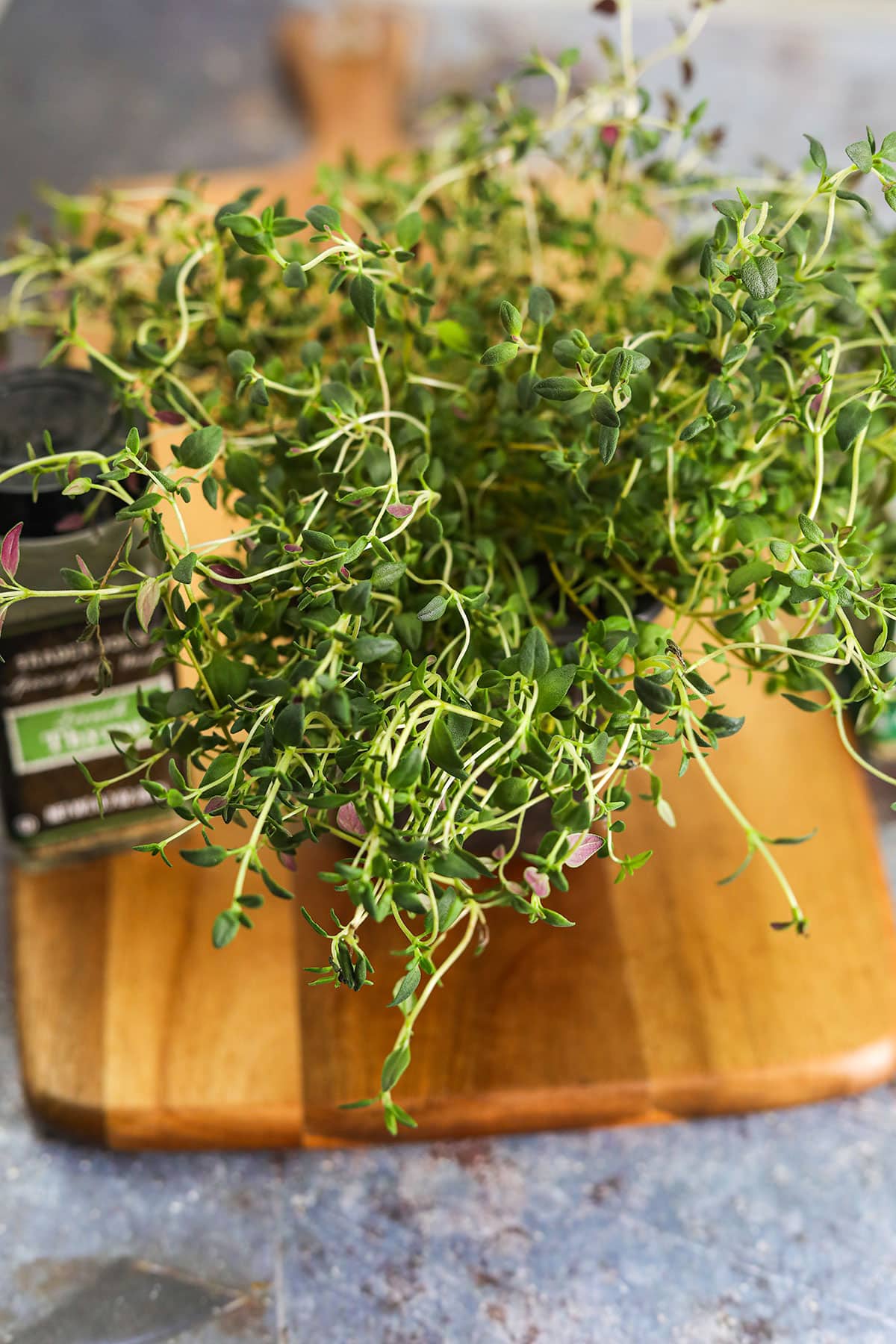Substitute For Thyme
Learn the substitute for thyme that can save you time and stress when you are cooking! Thyme is one of those herbs that is used in a lot of recipes here on the site, but unfortunately, it is not as popular as it should be.
Substitute For Thyme
Sometimes you might need to find a good substitute for thyme, whether you are allergic to it or you are making a recipe and you ran out of it.
I’m going to share with you several pantry staple herbs that are a good substitute for thyme. Check out our Jamaican Rice And Pigeon Peas, Black Bean Butternut Squash Stew and Jamaican Steamed Cabbage Recipes!
But before we dive in, how good are you at riddles? Can you solve this riddle? “My first is in time, but never in rhyme. My second is in thine, but not in mine. The third is in buy, but not in dye. My fourth is in team, but not in scream. My last is in bite, but never in bright.”
Take a minute, did you get it? Well, it’s about thyme! No pun intended. Its always good to give your brain a quick teaser and this herb- thyme- is all about producing those nutrients that assist the brain to operate more efficiently.

What is Thyme?
Thyme is classified as versatile as it has many uses where it has antifungal, antibacterial, and anti-inflammatory properties.
Thyme derives from the genus thymus, where there are over 300 species of plants and subshrubs that are considered aromatic, perennial, and herbaceous within the mint family called Lamiaceae.
That means there are different varieties that you can choose from but only a few you can cook with. The most popular one is scientifically called thymus vulgaris.
Other names for this type of thyme are common, English, French, and garden thyme. This thyme is green in color and has been a world of splendor to cooking. Each type of thyme varies in flowers, size, and even height! But they all have green leaves when they start to grow with similar healing properties.
Health Benefits of Thyme
You might be wondering ‘what is thyme good for?’ right? Well, it has many nutrients like; Vitamin A, B(3 & 6) C and K, fiber, iron, copper, manganese, folate, potassium, amino acids (tryptophan, lysine, isoleucine, leucine, valine, threonine) omega-3 fatty acids, magnesium, calcium, phosphorous, thymol, and zinc. But what do these nutrients and substances help to do?
- Boosts the immune system
- Stop coughing and heals sore throat
- Lowers blood pressure
- Improves blood circulation
- Relieves stress
- Relieves stomach ache
- Removes acne- (this is due to the tincture made solution but must be used in moderate proportion as it may cause burning.)
- Improves vision
- Fight against bacterial and fungal infections
- Treats respiratory ailments like bronchitis, arthritis, and colic
- Aids in the treatment of dyspraxia
- Prevents heart disease
- Improves digestion
 What Can I Substitute For Thyme?
What Can I Substitute For Thyme?
Oregano, savory, marjoram, basil, Italian seasoning, herbes de provence and zaatar; all these are good replacement for thyme. These herbs fall under the same family, having similar benefits to improve your health.
1. Oregano
Thyme has a woodsy, earthy, savory-sweet yet minty and peppery flavor that doesn’t overshadow other herbs when mixed together.
Oregano is quite similar where its taste is slightly more pungent, hence, the moderate proportion is recommended especially it is dried oregano (use half the amount of the required fresh thyme, if it is dried thyme then equal proportion).
2. Savory
The most popular type of savory is summer savory and winter savory, where the former is more popularly used. This is because summer savory isn’t as pungent and bitter as winter savory.
This herb has a similar taste to thyme but milder. Summer savory is immensely used in Canada where it is used to make a substance called crettonade, as a meat seasoning.
3. Marjoram
This herb is typically compared to oregano, where it has a sweet and savory taste that is milder than oregano.
It is also a part of the mint family where it has been relatively native or grown in North Africa, Western Asia and the Mediterranean. The herb is perennial where it is sensitive to a cold climate with sweet and citrus flavors.
4. Basil
This herb is also a part of the mint family where it has many benefits to the body. It includes nutrients like; Vitamin A, C and K, calcium, iron, omega-3 fatty acids magnesium, and manganese.
It is a good addition to meals to increase flavor, and it plays a major contributory role to Italian and Mediterranean cuisines. Some dishes that incorporate this herb are pizza, pasta, salads, pesto, and many more!
Top 3 Spice Blend Substitutes For Thyme:
Instead of relying on one flavor, you can also try using a spice blend for a similar taste profile to thyme.
1. Italian seasoning
There are various brands of Italian seasoning that have different ingredients; however, a traditional or typical Italian seasoning consists of dried oregano, marjoram, basil, thyme, and rosemary.
All of which are spicy and savory herbs mixed together giving it the same taste as thyme depending on the equivalent ratio of each ingredient/herb added.
This mixture is used as an all-purpose seasoning for various dishes like; pasta sauce, meatballs, poultry dishes, seafood, pizza sauce, etc.
2. Herbes de provence
Similar to Italian seasoning it is a mixture of spiced and dried herbs like; basil, bay leaf, marjoram, oregano, rosemary, savory, tarragon and thyme.
This mixture is often used in French cuisine, as it was popularly marketed in the 1970s as a new product stemming from Provence in France; although herbes de provence is also used in many Mediterranean cuisines.
Despite it being similar to Italian seasoning, it differs as it includes lavender flowers and a pungent floral taste. Another difference to know is that Italian seasoning was allegedly conceptualized in America while Herbes de provence was created in France.
3. Za’atar
This culinary herb blend has different varieties with a mixture of spiced herbs including dried; marjoram, oregano, sesame seeds (toasted), sumac, and thyme.
The mixture has a toasted yet tangy and herbal taste which gives a great flavor to seasoning meat and poultry.
Za’atar, like thyme, has really good health benefits; these include improving skin, boosting the immune system, building strong and healthy bones, soothing inflammation, mood and energy booster, aiding with memory and brain functionality, and helping to treat chronic diseases.

Recipes Using Thyme
- Coconut Lentil Curry
- Jackfruit Seed Curry
- Tofu Curry Recipe
- Jamaican Style Eggplant Curry
- Bitter Melon Potato Curry
- Jamaican Spicy Potato Curry
- Black-Eyed Peas Curry (Instant Pot)
- Curry Cabbage
- Zucchini And Green Peas Coconut Curry
Other Kitchen Tip Posts
- How Many Teaspoons Are In A Tablespoon?
- How Many Grams In An Ounce?
- Celsius To Fahrenheit Chart
- Slices In A Loaf Of Bread?
- How To Chop Green Onions
- Bay Leaf Substitute
Final Note
Sometimes we are in the kitchen and realize that we miss a special ingredient. Yes, it happens! So, with this article, we hope that we have provided you with good substitutes for thyme.
All the aforementioned herbs in this article are beneficial to your health and you can even drink some of them in the form of tea!
However, we recommend using these herbs in moderate proportions because despite their pros it may cause some cons for some persons. And as I like to say, Bon Appetit!
If you enjoyed this post about Substitutes For Thyme and would love to see more, join me on Youtube, Instagram, Facebook & Twitter!
Get discounted copies of my cookbook here.
Fortunately, because of the ads on our website, readers and subscribers of Healthier Steps are sponsoring many underprivileged families. Thank you!
Also, please leave a star rating! ;-)

 What Can I Substitute For Thyme?
What Can I Substitute For Thyme?




